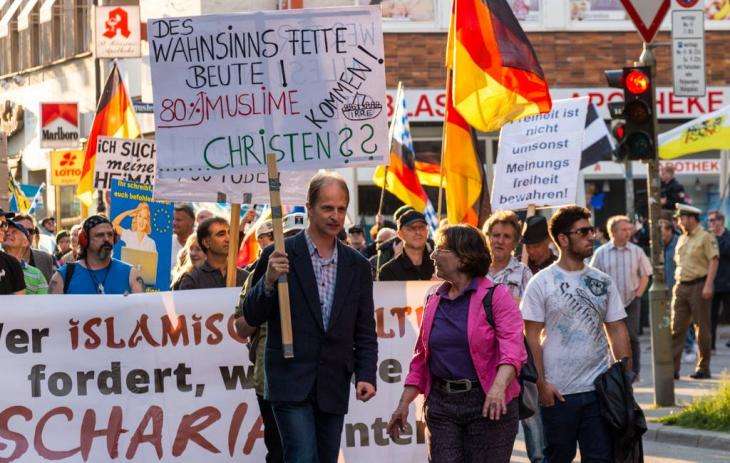Not just France, Islamophobia exists across Europe; Here are 4 examples

Much has been made of the recent burkini ban in France. France, once hailed as a bastion of freedom of expression and culture, has become a laughing stock across the world. While it's easy (and perfectly justified) to jump on the 'France is bigoted' bandwagon, the fact is that we're missing the bigger picture.
In exposing the latent Islamophobia present in French society by banning the burkini, France has made itself an easy scapegoat for a larger problem plaguing Europe. France isn't a lone black mark on an otherwise Islam-friendly continent, it's merely the most obvious symptom of a much larger European malaise.
Also read -The advent of refugee porn. And what makes it so wrong
From Germany to the Netherlands, here's how Europe, almost as a whole, is a simmering cauldron of anti-Islam sentiments:
1) Germany

Germany has been the most proactive country in Europe when it comes to helping refugees. In the past year, when refugee numbers to Europe hit unprecedented levels, Germany was hailed for its willingness to accept asylum seekers. Evidently though, that has come at a price.
A wave of small-scale terrorist attacks through the course of the summer has led to a surge in support for anti-refugee right wing parties. The Alternative for Germany (AfD) party has managed to make inroads in half of Germany's 16 regional parliaments. Currently polling at around 12% nationally, AfD only need 5% of the national vote to be ensured mainstream representation in Germany's Bundestag.
German society's issues with the influx of Muslim immigrants is also reflected in a recent poll. 81% of Germans polled by Infratest are in favour of a ban on the Islamic veil in some public spaces. More worryingly, 51% of respondents were in favour of a complete ban on the burqa itself, a la France. This despite many experts in France terming the ban a 'failure'.
Also read - World Refugee Day: For Myanmar's refugees, India a bleak house, not home
The sentiment, ostensibly, is one stemming from security fears. However, Peter Neumann, a professor of security studies at King's College states that, "I don't know of a single case in which a burqa ban stopped a terrorist attack or hindered someone's descent into terrorism."
Clearly, the paranoia about the burqa stems from its association to Islam, and with no tangible evidence linking the burqa directly to terrorism, the fear then stems from Islam itself, which is worrying.
2) Netherlands
While the anti-Islam sentiment in Germany isn't widely reflected in national-level politics yet, in the Netherlands, it's far closer to becoming a political reality.
The far-right Freedom Party, which is currently expected to gain the highest representation in the Dutch parliament in next year's elections, unveiled an unapologetically anti-Islamic 5-year plan. A key aim of their manifesto is to reverse the 'islamisation' of the country.
Their plans aren't subtle in the least, with promises to close Muslim schools, mosques, ban the Quran, Islamic attire and close borders to Musim immigrants.
The saving grace here is that their extreme policies make them highly unlikely to find coalition partners, a necessity in Dutch politics. This will keep them on the fringes of Dutch politics. However, the fact that they might double their current seat tally is symptomatic of a spread of Islamophobia.
3) United Kingdom
The UK's problems with multiculturalism surfaced during the Brexit referendum. For months preceding the Brexit vote, we saw politicians like Nigel Farage of UKIP touring the UK spreading fear of immigrants. However, at that time, it was still believed that his views, especially his anti-Islamic rhetoric, was still limited to the fringes.
The Brexit referendum proved how wrong that estimation was.
In the week immediately preceding and following the Brexit results, hate crimes surged by 42% in England and Wales. Areas that polled 'Leave' reported higher instances of hate crimes as well, showing a direct correlation.
Most recently, the United Nations's Committee on the Elimination of Racial Discrimination highlighted the extreme rhetoric parroted by British politicians trying to whip up anti-immigrant sentiments.
However, to lay the blame for this racism solely at Brexit's doorstep would be wrong. According to Tell MAMA, an anti-Muslim hate watchdog, 2015 saw a 316% rise in hate crimes against the Islamic community.
4) Italy
In the wake of France's burkini ban, Italy's interior minister was swift to reject the possibility of similar bans in Italy. However, this sort of level headed response is not indicative of all of Italy.
Magda Allam, an Egyptian-born Italian MP, has been unequivocal in his criticism and, indeed, hate-mongering against Islam. Allam, who has been an outspoken critic of Islam ever since his conversion to Christianity in 2008, has even gone as far as to compare Islam to 'a cancer'.
Also read - Refuse to equate Islam with violence, says Pope Francis
Meanwhile in Pisa, the site of the famous leaning tower, residents are campaigning to prevent the construction of a mosque some 400-metres from the monument. Gianluca Gambini, one of the politicians leading the charge against the mosque, says that 57% of Pisans are against it. His anti-mosque reasoning is that "mosques are places where there is a risk of radicalization."
First published: 27 August 2016, 11:40 IST






![BJP's Kapil Mishra recreates Shankar Mahadevan’s ‘Breathless’ song to highlight Delhi pollution [WATCH] BJP's Kapil Mishra recreates Shankar Mahadevan’s ‘Breathless’ song to highlight Delhi pollution [WATCH]](https://images.catchnews.com/upload/2022/11/03/kapil-mishra_240884_300x172.png)

![Anupam Kher shares pictures of his toned body on 67th birthday [MUST SEE] Anupam Kher shares pictures of his toned body on 67th birthday [MUST SEE]](https://images.catchnews.com/upload/2022/03/07/Anupam_kher_231145_300x172.jpg)






